Corporate Events Management: Types, Planning, and Analysis
VerifiedAdded on 2023/01/04
|13
|4011
|62
Report
AI Summary
This report provides a comprehensive overview of corporate event management, exploring various types of events such as sales meetings, product launches, and exhibitions. It contrasts corporate events with leisure events, highlighting differences in planning, promotion, and funding. The report delves into how corporate events align with strategic goals, including increasing sales, brand awareness, and market share. It examines methods for identifying potential audiences through market research, customer profiling, competitor analysis, and past attendee data. Furthermore, the report assesses the feasibility of corporate events, considering risks, time constraints, and financial aspects. It also touches upon promotional principles and the overall planning process, offering a complete understanding of corporate event management practices.
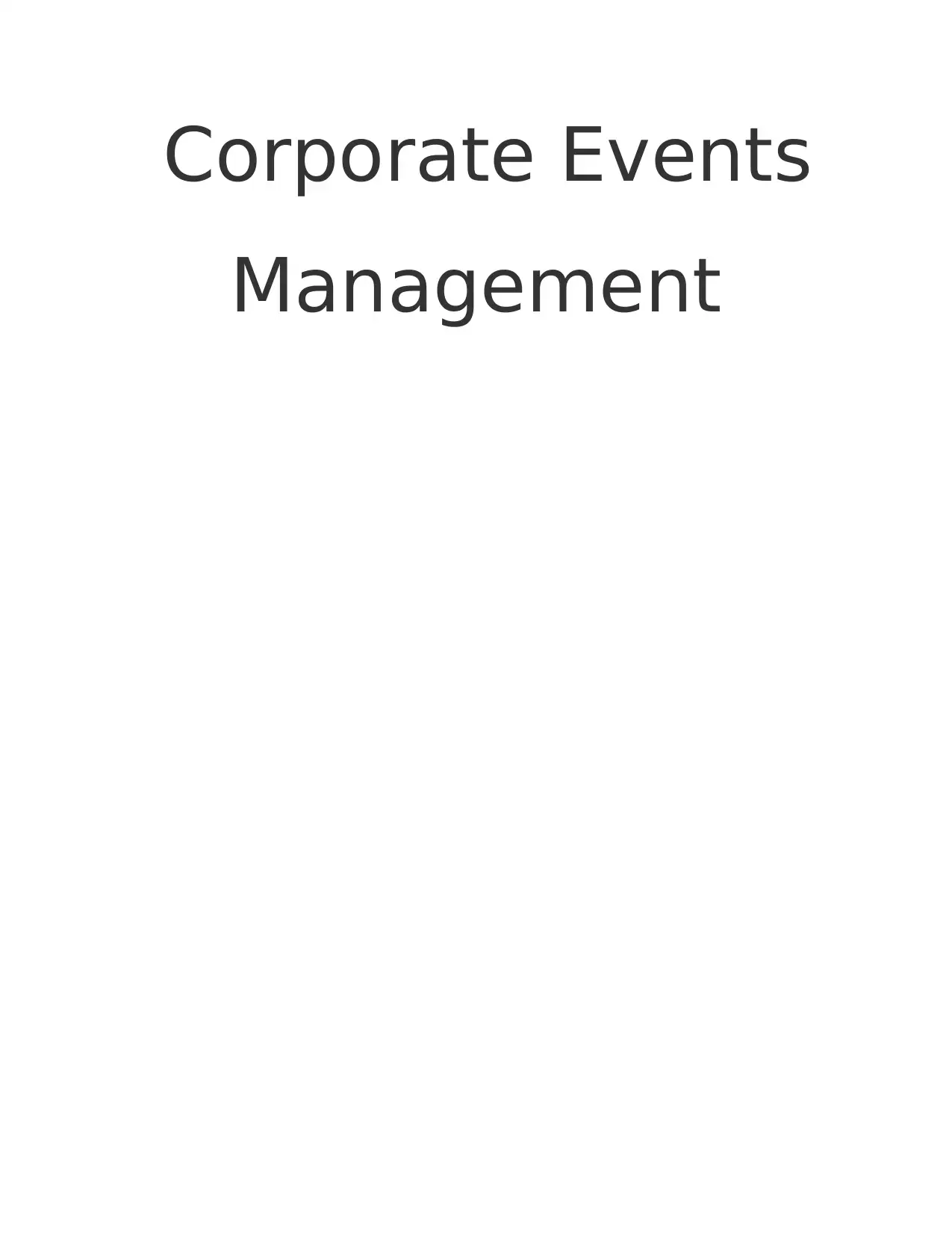
Corporate Events
Management
Management
Paraphrase This Document
Need a fresh take? Get an instant paraphrase of this document with our AI Paraphraser
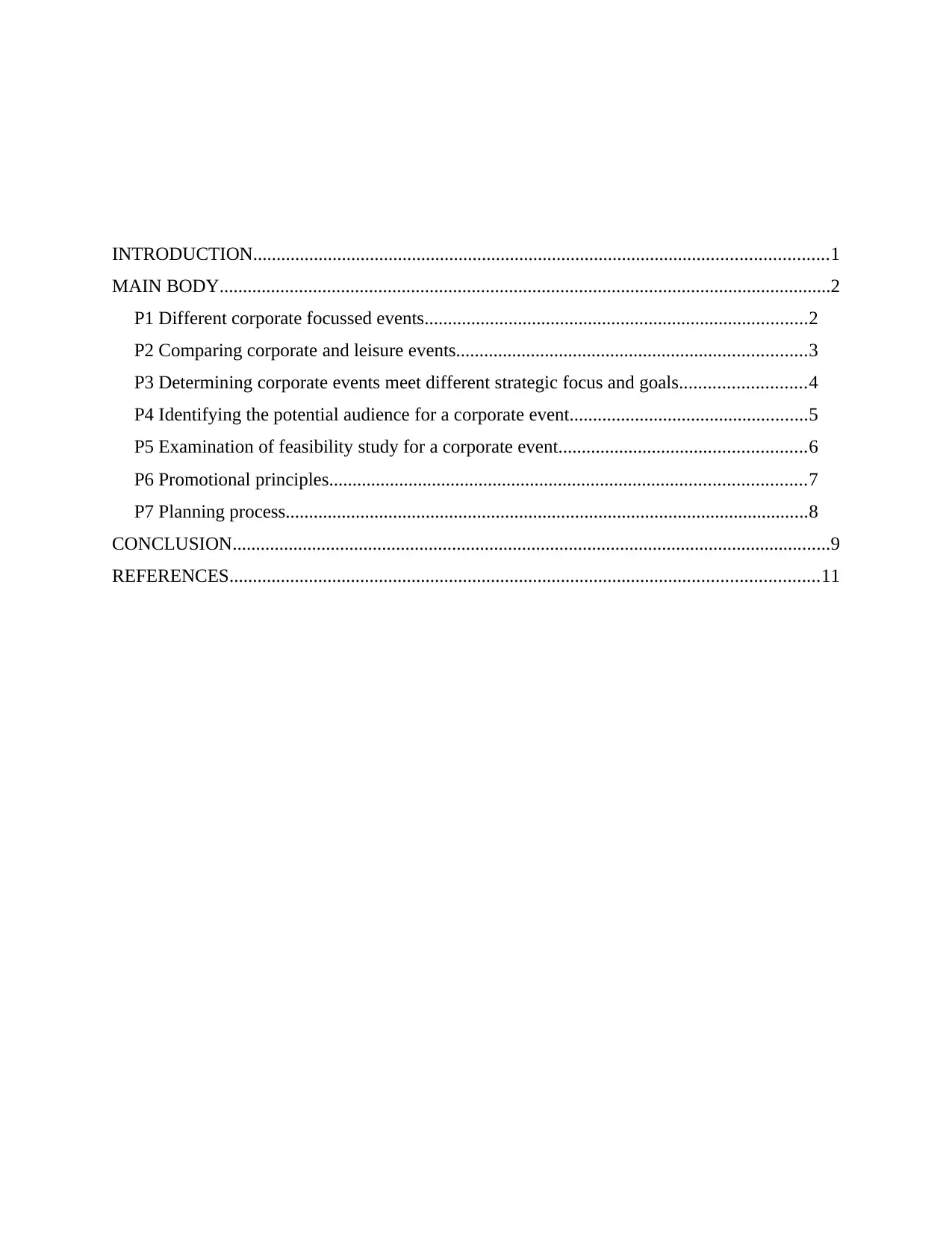
INTRODUCTION...........................................................................................................................1
MAIN BODY...................................................................................................................................2
P1 Different corporate focussed events..................................................................................2
P2 Comparing corporate and leisure events...........................................................................3
P3 Determining corporate events meet different strategic focus and goals...........................4
P4 Identifying the potential audience for a corporate event...................................................5
P5 Examination of feasibility study for a corporate event.....................................................6
P6 Promotional principles......................................................................................................7
P7 Planning process................................................................................................................8
CONCLUSION................................................................................................................................9
REFERENCES..............................................................................................................................11
MAIN BODY...................................................................................................................................2
P1 Different corporate focussed events..................................................................................2
P2 Comparing corporate and leisure events...........................................................................3
P3 Determining corporate events meet different strategic focus and goals...........................4
P4 Identifying the potential audience for a corporate event...................................................5
P5 Examination of feasibility study for a corporate event.....................................................6
P6 Promotional principles......................................................................................................7
P7 Planning process................................................................................................................8
CONCLUSION................................................................................................................................9
REFERENCES..............................................................................................................................11
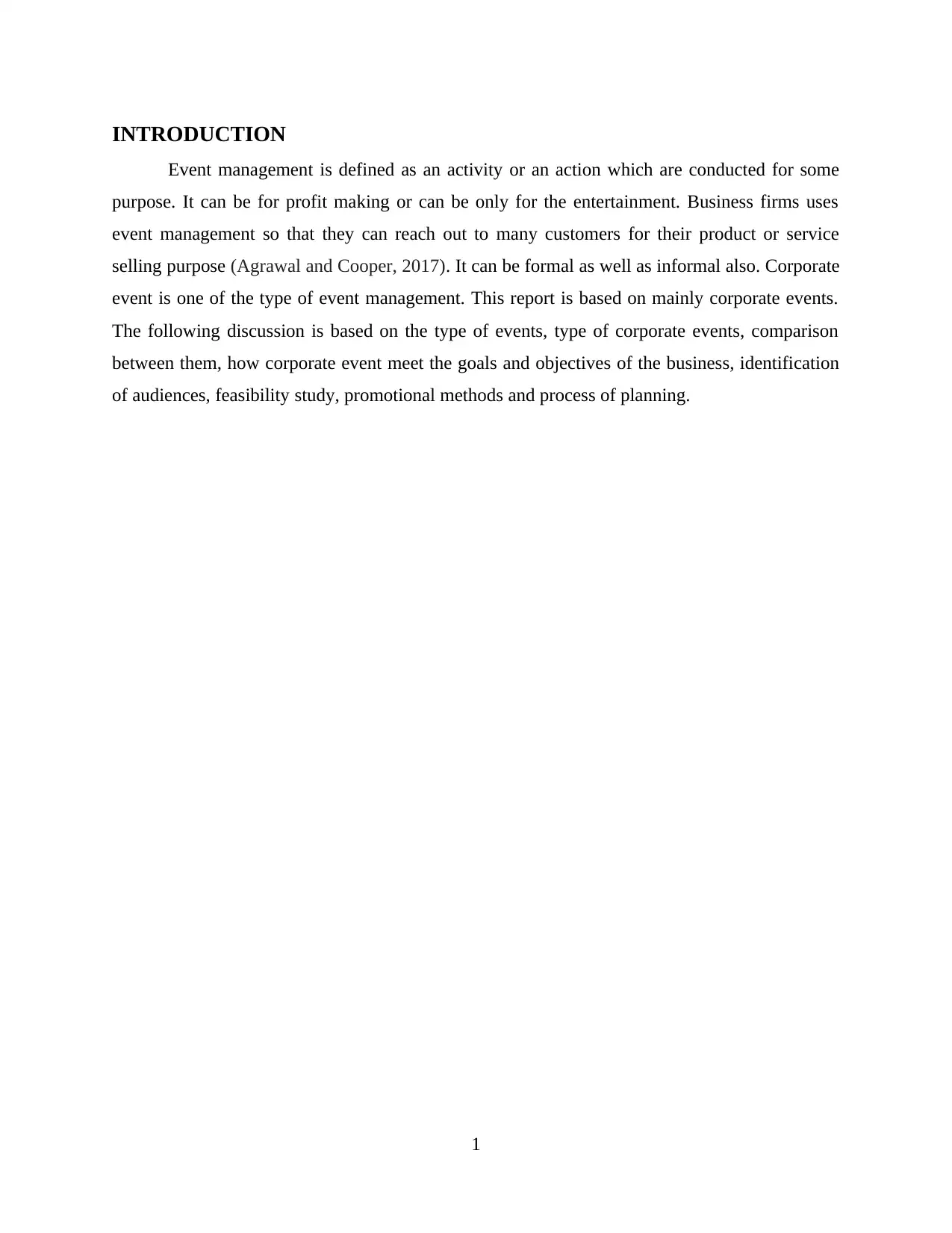
INTRODUCTION
Event management is defined as an activity or an action which are conducted for some
purpose. It can be for profit making or can be only for the entertainment. Business firms uses
event management so that they can reach out to many customers for their product or service
selling purpose (Agrawal and Cooper, 2017). It can be formal as well as informal also. Corporate
event is one of the type of event management. This report is based on mainly corporate events.
The following discussion is based on the type of events, type of corporate events, comparison
between them, how corporate event meet the goals and objectives of the business, identification
of audiences, feasibility study, promotional methods and process of planning.
1
Event management is defined as an activity or an action which are conducted for some
purpose. It can be for profit making or can be only for the entertainment. Business firms uses
event management so that they can reach out to many customers for their product or service
selling purpose (Agrawal and Cooper, 2017). It can be formal as well as informal also. Corporate
event is one of the type of event management. This report is based on mainly corporate events.
The following discussion is based on the type of events, type of corporate events, comparison
between them, how corporate event meet the goals and objectives of the business, identification
of audiences, feasibility study, promotional methods and process of planning.
1
⊘ This is a preview!⊘
Do you want full access?
Subscribe today to unlock all pages.

Trusted by 1+ million students worldwide
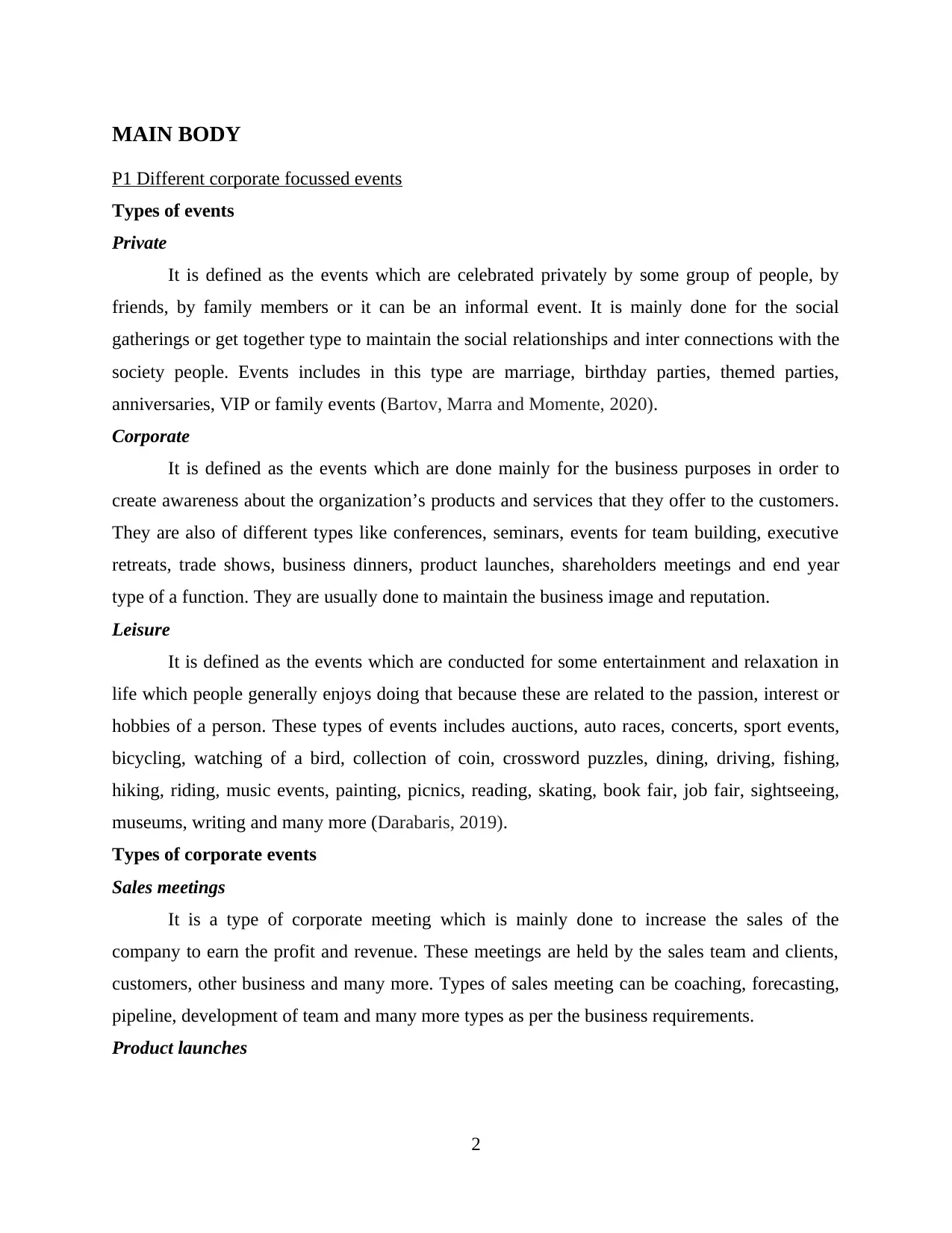
MAIN BODY
P1 Different corporate focussed events
Types of events
Private
It is defined as the events which are celebrated privately by some group of people, by
friends, by family members or it can be an informal event. It is mainly done for the social
gatherings or get together type to maintain the social relationships and inter connections with the
society people. Events includes in this type are marriage, birthday parties, themed parties,
anniversaries, VIP or family events (Bartov, Marra and Momente, 2020).
Corporate
It is defined as the events which are done mainly for the business purposes in order to
create awareness about the organization’s products and services that they offer to the customers.
They are also of different types like conferences, seminars, events for team building, executive
retreats, trade shows, business dinners, product launches, shareholders meetings and end year
type of a function. They are usually done to maintain the business image and reputation.
Leisure
It is defined as the events which are conducted for some entertainment and relaxation in
life which people generally enjoys doing that because these are related to the passion, interest or
hobbies of a person. These types of events includes auctions, auto races, concerts, sport events,
bicycling, watching of a bird, collection of coin, crossword puzzles, dining, driving, fishing,
hiking, riding, music events, painting, picnics, reading, skating, book fair, job fair, sightseeing,
museums, writing and many more (Darabaris, 2019).
Types of corporate events
Sales meetings
It is a type of corporate meeting which is mainly done to increase the sales of the
company to earn the profit and revenue. These meetings are held by the sales team and clients,
customers, other business and many more. Types of sales meeting can be coaching, forecasting,
pipeline, development of team and many more types as per the business requirements.
Product launches
2
P1 Different corporate focussed events
Types of events
Private
It is defined as the events which are celebrated privately by some group of people, by
friends, by family members or it can be an informal event. It is mainly done for the social
gatherings or get together type to maintain the social relationships and inter connections with the
society people. Events includes in this type are marriage, birthday parties, themed parties,
anniversaries, VIP or family events (Bartov, Marra and Momente, 2020).
Corporate
It is defined as the events which are done mainly for the business purposes in order to
create awareness about the organization’s products and services that they offer to the customers.
They are also of different types like conferences, seminars, events for team building, executive
retreats, trade shows, business dinners, product launches, shareholders meetings and end year
type of a function. They are usually done to maintain the business image and reputation.
Leisure
It is defined as the events which are conducted for some entertainment and relaxation in
life which people generally enjoys doing that because these are related to the passion, interest or
hobbies of a person. These types of events includes auctions, auto races, concerts, sport events,
bicycling, watching of a bird, collection of coin, crossword puzzles, dining, driving, fishing,
hiking, riding, music events, painting, picnics, reading, skating, book fair, job fair, sightseeing,
museums, writing and many more (Darabaris, 2019).
Types of corporate events
Sales meetings
It is a type of corporate meeting which is mainly done to increase the sales of the
company to earn the profit and revenue. These meetings are held by the sales team and clients,
customers, other business and many more. Types of sales meeting can be coaching, forecasting,
pipeline, development of team and many more types as per the business requirements.
Product launches
2
Paraphrase This Document
Need a fresh take? Get an instant paraphrase of this document with our AI Paraphraser
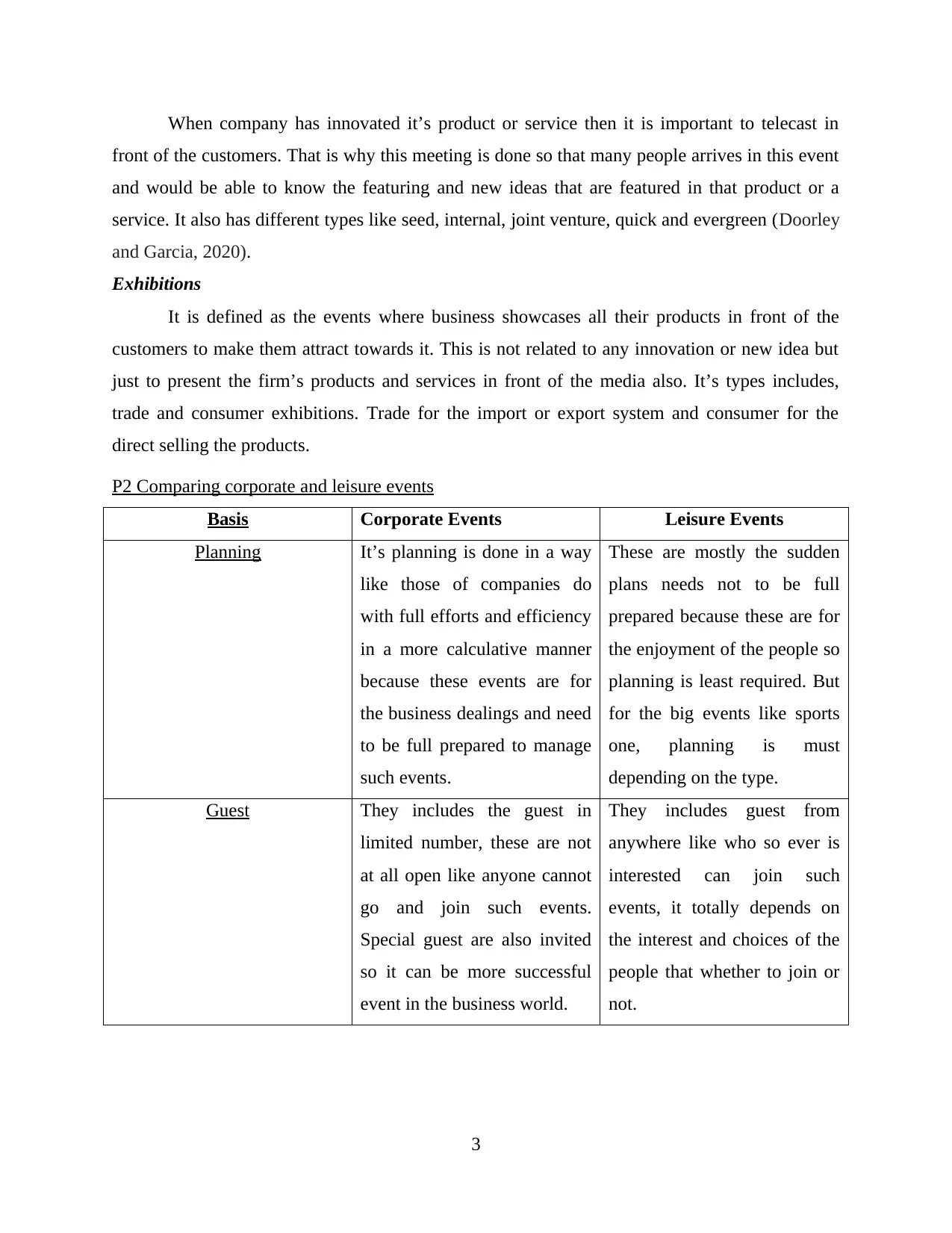
When company has innovated it’s product or service then it is important to telecast in
front of the customers. That is why this meeting is done so that many people arrives in this event
and would be able to know the featuring and new ideas that are featured in that product or a
service. It also has different types like seed, internal, joint venture, quick and evergreen (Doorley
and Garcia, 2020).
Exhibitions
It is defined as the events where business showcases all their products in front of the
customers to make them attract towards it. This is not related to any innovation or new idea but
just to present the firm’s products and services in front of the media also. It’s types includes,
trade and consumer exhibitions. Trade for the import or export system and consumer for the
direct selling the products.
P2 Comparing corporate and leisure events
Basis Corporate Events Leisure Events
Planning It’s planning is done in a way
like those of companies do
with full efforts and efficiency
in a more calculative manner
because these events are for
the business dealings and need
to be full prepared to manage
such events.
These are mostly the sudden
plans needs not to be full
prepared because these are for
the enjoyment of the people so
planning is least required. But
for the big events like sports
one, planning is must
depending on the type.
Guest They includes the guest in
limited number, these are not
at all open like anyone cannot
go and join such events.
Special guest are also invited
so it can be more successful
event in the business world.
They includes guest from
anywhere like who so ever is
interested can join such
events, it totally depends on
the interest and choices of the
people that whether to join or
not.
3
front of the customers. That is why this meeting is done so that many people arrives in this event
and would be able to know the featuring and new ideas that are featured in that product or a
service. It also has different types like seed, internal, joint venture, quick and evergreen (Doorley
and Garcia, 2020).
Exhibitions
It is defined as the events where business showcases all their products in front of the
customers to make them attract towards it. This is not related to any innovation or new idea but
just to present the firm’s products and services in front of the media also. It’s types includes,
trade and consumer exhibitions. Trade for the import or export system and consumer for the
direct selling the products.
P2 Comparing corporate and leisure events
Basis Corporate Events Leisure Events
Planning It’s planning is done in a way
like those of companies do
with full efforts and efficiency
in a more calculative manner
because these events are for
the business dealings and need
to be full prepared to manage
such events.
These are mostly the sudden
plans needs not to be full
prepared because these are for
the enjoyment of the people so
planning is least required. But
for the big events like sports
one, planning is must
depending on the type.
Guest They includes the guest in
limited number, these are not
at all open like anyone cannot
go and join such events.
Special guest are also invited
so it can be more successful
event in the business world.
They includes guest from
anywhere like who so ever is
interested can join such
events, it totally depends on
the interest and choices of the
people that whether to join or
not.
3
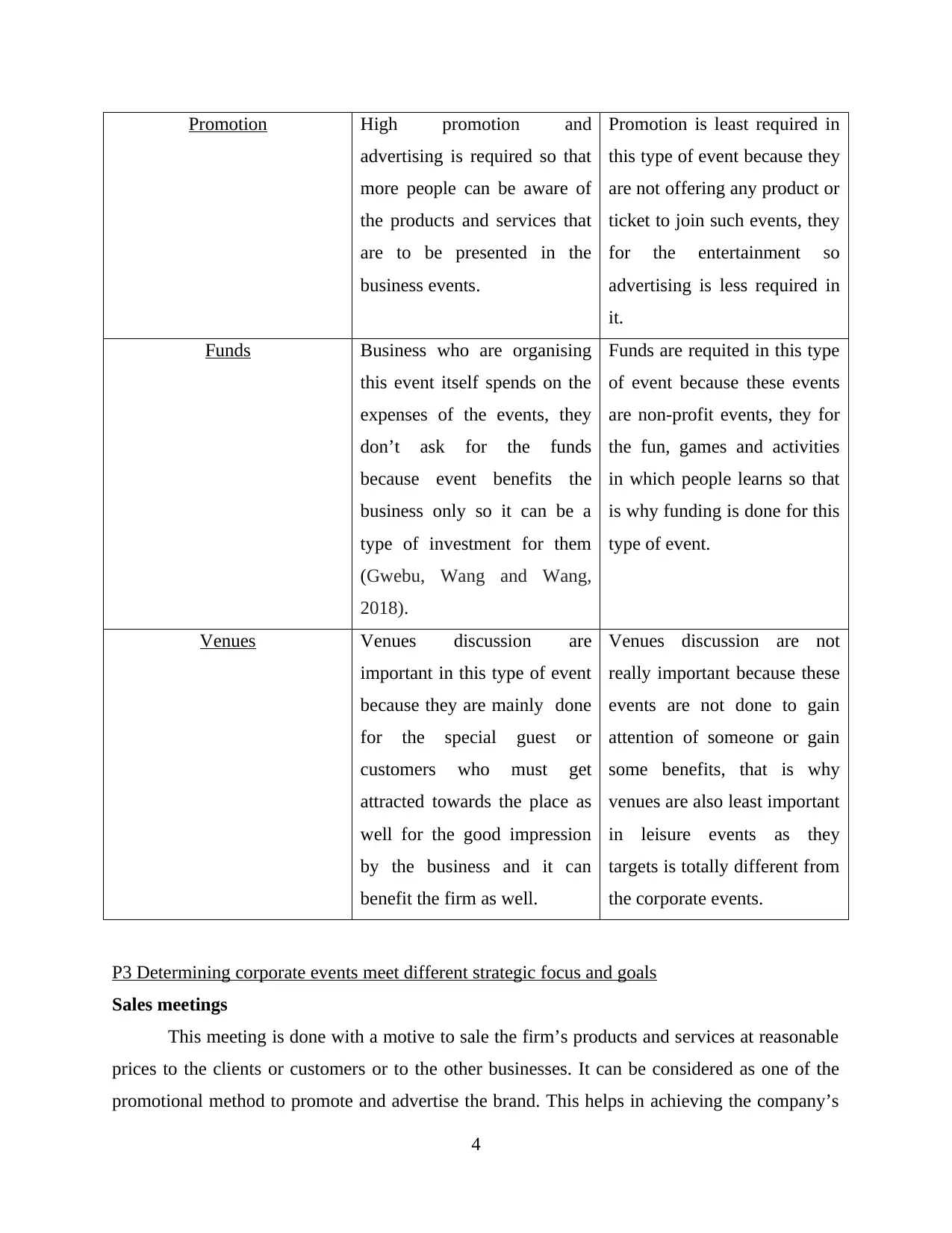
Promotion High promotion and
advertising is required so that
more people can be aware of
the products and services that
are to be presented in the
business events.
Promotion is least required in
this type of event because they
are not offering any product or
ticket to join such events, they
for the entertainment so
advertising is less required in
it.
Funds Business who are organising
this event itself spends on the
expenses of the events, they
don’t ask for the funds
because event benefits the
business only so it can be a
type of investment for them
(Gwebu, Wang and Wang,
2018).
Funds are requited in this type
of event because these events
are non-profit events, they for
the fun, games and activities
in which people learns so that
is why funding is done for this
type of event.
Venues Venues discussion are
important in this type of event
because they are mainly done
for the special guest or
customers who must get
attracted towards the place as
well for the good impression
by the business and it can
benefit the firm as well.
Venues discussion are not
really important because these
events are not done to gain
attention of someone or gain
some benefits, that is why
venues are also least important
in leisure events as they
targets is totally different from
the corporate events.
P3 Determining corporate events meet different strategic focus and goals
Sales meetings
This meeting is done with a motive to sale the firm’s products and services at reasonable
prices to the clients or customers or to the other businesses. It can be considered as one of the
promotional method to promote and advertise the brand. This helps in achieving the company’s
4
advertising is required so that
more people can be aware of
the products and services that
are to be presented in the
business events.
Promotion is least required in
this type of event because they
are not offering any product or
ticket to join such events, they
for the entertainment so
advertising is less required in
it.
Funds Business who are organising
this event itself spends on the
expenses of the events, they
don’t ask for the funds
because event benefits the
business only so it can be a
type of investment for them
(Gwebu, Wang and Wang,
2018).
Funds are requited in this type
of event because these events
are non-profit events, they for
the fun, games and activities
in which people learns so that
is why funding is done for this
type of event.
Venues Venues discussion are
important in this type of event
because they are mainly done
for the special guest or
customers who must get
attracted towards the place as
well for the good impression
by the business and it can
benefit the firm as well.
Venues discussion are not
really important because these
events are not done to gain
attention of someone or gain
some benefits, that is why
venues are also least important
in leisure events as they
targets is totally different from
the corporate events.
P3 Determining corporate events meet different strategic focus and goals
Sales meetings
This meeting is done with a motive to sale the firm’s products and services at reasonable
prices to the clients or customers or to the other businesses. It can be considered as one of the
promotional method to promote and advertise the brand. This helps in achieving the company’s
4
⊘ This is a preview!⊘
Do you want full access?
Subscribe today to unlock all pages.

Trusted by 1+ million students worldwide
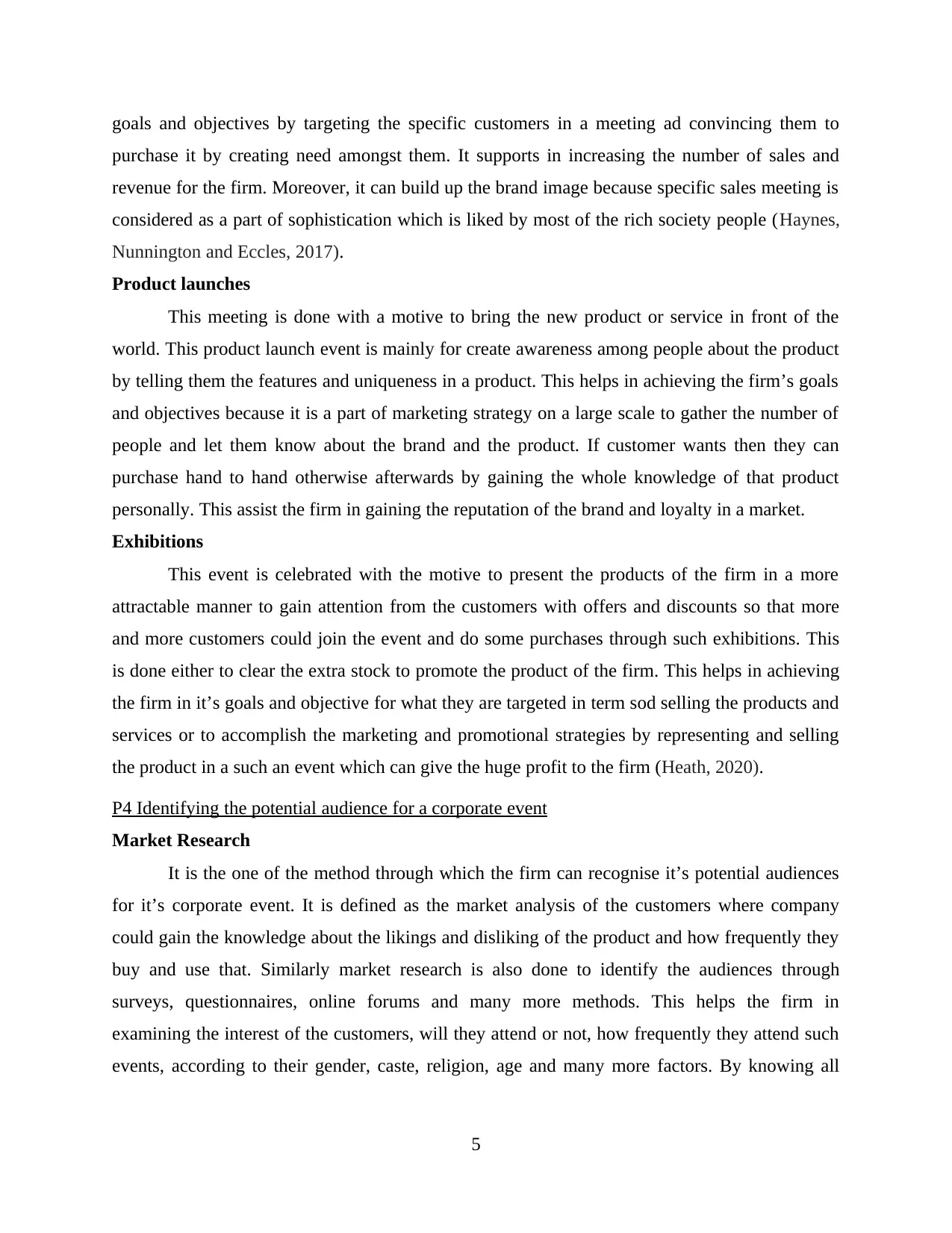
goals and objectives by targeting the specific customers in a meeting ad convincing them to
purchase it by creating need amongst them. It supports in increasing the number of sales and
revenue for the firm. Moreover, it can build up the brand image because specific sales meeting is
considered as a part of sophistication which is liked by most of the rich society people (Haynes,
Nunnington and Eccles, 2017).
Product launches
This meeting is done with a motive to bring the new product or service in front of the
world. This product launch event is mainly for create awareness among people about the product
by telling them the features and uniqueness in a product. This helps in achieving the firm’s goals
and objectives because it is a part of marketing strategy on a large scale to gather the number of
people and let them know about the brand and the product. If customer wants then they can
purchase hand to hand otherwise afterwards by gaining the whole knowledge of that product
personally. This assist the firm in gaining the reputation of the brand and loyalty in a market.
Exhibitions
This event is celebrated with the motive to present the products of the firm in a more
attractable manner to gain attention from the customers with offers and discounts so that more
and more customers could join the event and do some purchases through such exhibitions. This
is done either to clear the extra stock to promote the product of the firm. This helps in achieving
the firm in it’s goals and objective for what they are targeted in term sod selling the products and
services or to accomplish the marketing and promotional strategies by representing and selling
the product in a such an event which can give the huge profit to the firm (Heath, 2020).
P4 Identifying the potential audience for a corporate event
Market Research
It is the one of the method through which the firm can recognise it’s potential audiences
for it’s corporate event. It is defined as the market analysis of the customers where company
could gain the knowledge about the likings and disliking of the product and how frequently they
buy and use that. Similarly market research is also done to identify the audiences through
surveys, questionnaires, online forums and many more methods. This helps the firm in
examining the interest of the customers, will they attend or not, how frequently they attend such
events, according to their gender, caste, religion, age and many more factors. By knowing all
5
purchase it by creating need amongst them. It supports in increasing the number of sales and
revenue for the firm. Moreover, it can build up the brand image because specific sales meeting is
considered as a part of sophistication which is liked by most of the rich society people (Haynes,
Nunnington and Eccles, 2017).
Product launches
This meeting is done with a motive to bring the new product or service in front of the
world. This product launch event is mainly for create awareness among people about the product
by telling them the features and uniqueness in a product. This helps in achieving the firm’s goals
and objectives because it is a part of marketing strategy on a large scale to gather the number of
people and let them know about the brand and the product. If customer wants then they can
purchase hand to hand otherwise afterwards by gaining the whole knowledge of that product
personally. This assist the firm in gaining the reputation of the brand and loyalty in a market.
Exhibitions
This event is celebrated with the motive to present the products of the firm in a more
attractable manner to gain attention from the customers with offers and discounts so that more
and more customers could join the event and do some purchases through such exhibitions. This
is done either to clear the extra stock to promote the product of the firm. This helps in achieving
the firm in it’s goals and objective for what they are targeted in term sod selling the products and
services or to accomplish the marketing and promotional strategies by representing and selling
the product in a such an event which can give the huge profit to the firm (Heath, 2020).
P4 Identifying the potential audience for a corporate event
Market Research
It is the one of the method through which the firm can recognise it’s potential audiences
for it’s corporate event. It is defined as the market analysis of the customers where company
could gain the knowledge about the likings and disliking of the product and how frequently they
buy and use that. Similarly market research is also done to identify the audiences through
surveys, questionnaires, online forums and many more methods. This helps the firm in
examining the interest of the customers, will they attend or not, how frequently they attend such
events, according to their gender, caste, religion, age and many more factors. By knowing all
5
Paraphrase This Document
Need a fresh take? Get an instant paraphrase of this document with our AI Paraphraser
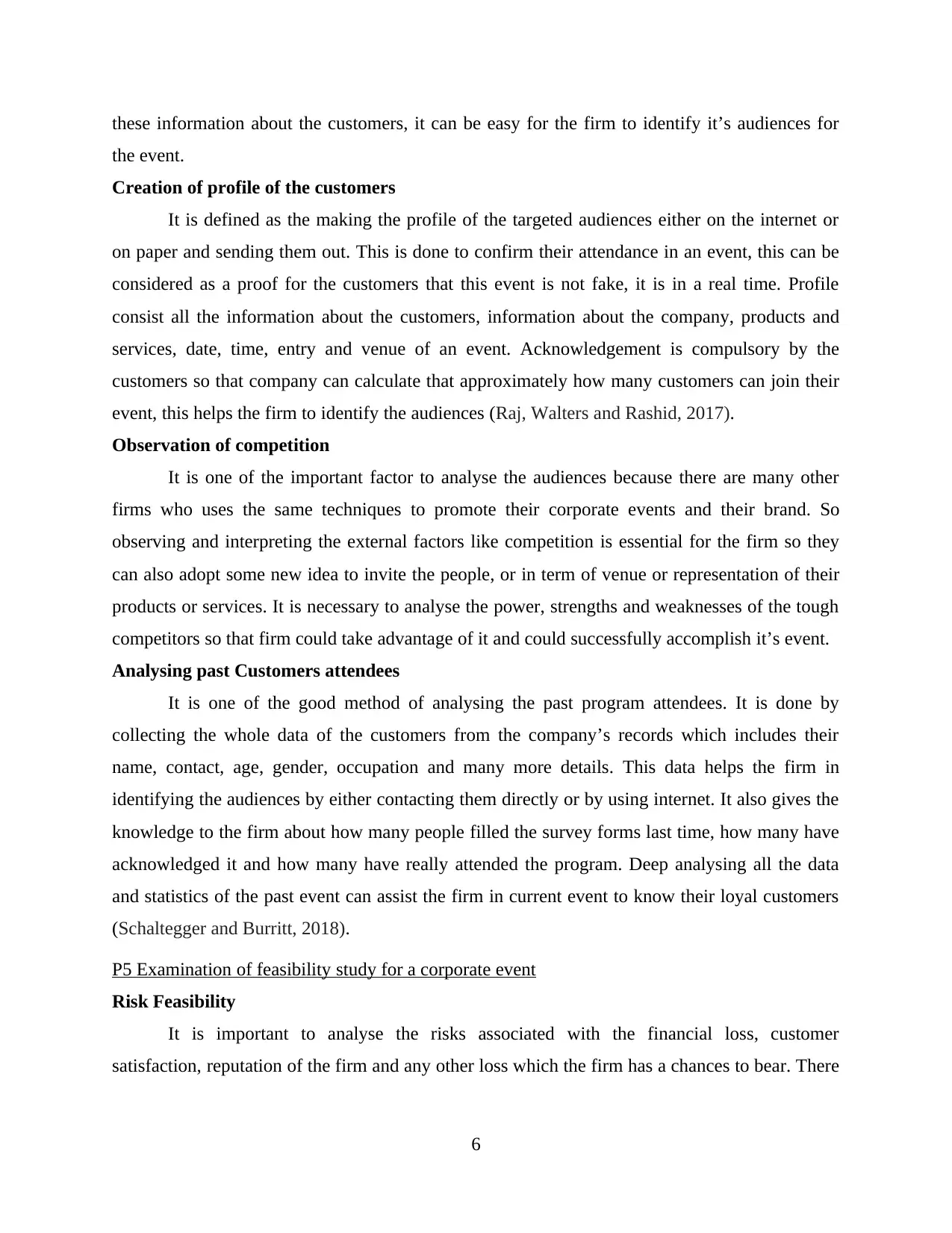
these information about the customers, it can be easy for the firm to identify it’s audiences for
the event.
Creation of profile of the customers
It is defined as the making the profile of the targeted audiences either on the internet or
on paper and sending them out. This is done to confirm their attendance in an event, this can be
considered as a proof for the customers that this event is not fake, it is in a real time. Profile
consist all the information about the customers, information about the company, products and
services, date, time, entry and venue of an event. Acknowledgement is compulsory by the
customers so that company can calculate that approximately how many customers can join their
event, this helps the firm to identify the audiences (Raj, Walters and Rashid, 2017).
Observation of competition
It is one of the important factor to analyse the audiences because there are many other
firms who uses the same techniques to promote their corporate events and their brand. So
observing and interpreting the external factors like competition is essential for the firm so they
can also adopt some new idea to invite the people, or in term of venue or representation of their
products or services. It is necessary to analyse the power, strengths and weaknesses of the tough
competitors so that firm could take advantage of it and could successfully accomplish it’s event.
Analysing past Customers attendees
It is one of the good method of analysing the past program attendees. It is done by
collecting the whole data of the customers from the company’s records which includes their
name, contact, age, gender, occupation and many more details. This data helps the firm in
identifying the audiences by either contacting them directly or by using internet. It also gives the
knowledge to the firm about how many people filled the survey forms last time, how many have
acknowledged it and how many have really attended the program. Deep analysing all the data
and statistics of the past event can assist the firm in current event to know their loyal customers
(Schaltegger and Burritt, 2018).
P5 Examination of feasibility study for a corporate event
Risk Feasibility
It is important to analyse the risks associated with the financial loss, customer
satisfaction, reputation of the firm and any other loss which the firm has a chances to bear. There
6
the event.
Creation of profile of the customers
It is defined as the making the profile of the targeted audiences either on the internet or
on paper and sending them out. This is done to confirm their attendance in an event, this can be
considered as a proof for the customers that this event is not fake, it is in a real time. Profile
consist all the information about the customers, information about the company, products and
services, date, time, entry and venue of an event. Acknowledgement is compulsory by the
customers so that company can calculate that approximately how many customers can join their
event, this helps the firm to identify the audiences (Raj, Walters and Rashid, 2017).
Observation of competition
It is one of the important factor to analyse the audiences because there are many other
firms who uses the same techniques to promote their corporate events and their brand. So
observing and interpreting the external factors like competition is essential for the firm so they
can also adopt some new idea to invite the people, or in term of venue or representation of their
products or services. It is necessary to analyse the power, strengths and weaknesses of the tough
competitors so that firm could take advantage of it and could successfully accomplish it’s event.
Analysing past Customers attendees
It is one of the good method of analysing the past program attendees. It is done by
collecting the whole data of the customers from the company’s records which includes their
name, contact, age, gender, occupation and many more details. This data helps the firm in
identifying the audiences by either contacting them directly or by using internet. It also gives the
knowledge to the firm about how many people filled the survey forms last time, how many have
acknowledged it and how many have really attended the program. Deep analysing all the data
and statistics of the past event can assist the firm in current event to know their loyal customers
(Schaltegger and Burritt, 2018).
P5 Examination of feasibility study for a corporate event
Risk Feasibility
It is important to analyse the risks associated with the financial loss, customer
satisfaction, reputation of the firm and any other loss which the firm has a chances to bear. There
6
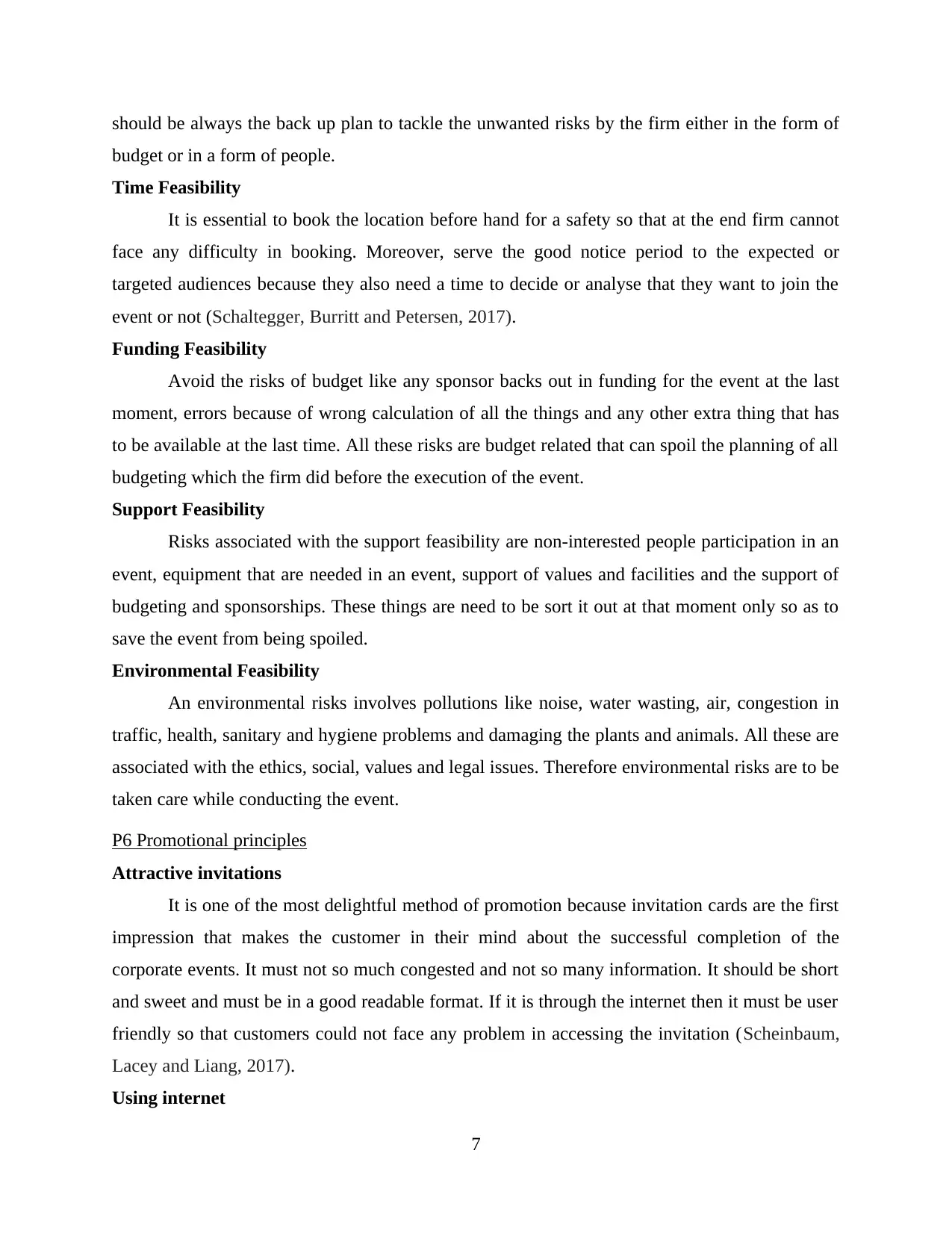
should be always the back up plan to tackle the unwanted risks by the firm either in the form of
budget or in a form of people.
Time Feasibility
It is essential to book the location before hand for a safety so that at the end firm cannot
face any difficulty in booking. Moreover, serve the good notice period to the expected or
targeted audiences because they also need a time to decide or analyse that they want to join the
event or not (Schaltegger, Burritt and Petersen, 2017).
Funding Feasibility
Avoid the risks of budget like any sponsor backs out in funding for the event at the last
moment, errors because of wrong calculation of all the things and any other extra thing that has
to be available at the last time. All these risks are budget related that can spoil the planning of all
budgeting which the firm did before the execution of the event.
Support Feasibility
Risks associated with the support feasibility are non-interested people participation in an
event, equipment that are needed in an event, support of values and facilities and the support of
budgeting and sponsorships. These things are need to be sort it out at that moment only so as to
save the event from being spoiled.
Environmental Feasibility
An environmental risks involves pollutions like noise, water wasting, air, congestion in
traffic, health, sanitary and hygiene problems and damaging the plants and animals. All these are
associated with the ethics, social, values and legal issues. Therefore environmental risks are to be
taken care while conducting the event.
P6 Promotional principles
Attractive invitations
It is one of the most delightful method of promotion because invitation cards are the first
impression that makes the customer in their mind about the successful completion of the
corporate events. It must not so much congested and not so many information. It should be short
and sweet and must be in a good readable format. If it is through the internet then it must be user
friendly so that customers could not face any problem in accessing the invitation (Scheinbaum,
Lacey and Liang, 2017).
Using internet
7
budget or in a form of people.
Time Feasibility
It is essential to book the location before hand for a safety so that at the end firm cannot
face any difficulty in booking. Moreover, serve the good notice period to the expected or
targeted audiences because they also need a time to decide or analyse that they want to join the
event or not (Schaltegger, Burritt and Petersen, 2017).
Funding Feasibility
Avoid the risks of budget like any sponsor backs out in funding for the event at the last
moment, errors because of wrong calculation of all the things and any other extra thing that has
to be available at the last time. All these risks are budget related that can spoil the planning of all
budgeting which the firm did before the execution of the event.
Support Feasibility
Risks associated with the support feasibility are non-interested people participation in an
event, equipment that are needed in an event, support of values and facilities and the support of
budgeting and sponsorships. These things are need to be sort it out at that moment only so as to
save the event from being spoiled.
Environmental Feasibility
An environmental risks involves pollutions like noise, water wasting, air, congestion in
traffic, health, sanitary and hygiene problems and damaging the plants and animals. All these are
associated with the ethics, social, values and legal issues. Therefore environmental risks are to be
taken care while conducting the event.
P6 Promotional principles
Attractive invitations
It is one of the most delightful method of promotion because invitation cards are the first
impression that makes the customer in their mind about the successful completion of the
corporate events. It must not so much congested and not so many information. It should be short
and sweet and must be in a good readable format. If it is through the internet then it must be user
friendly so that customers could not face any problem in accessing the invitation (Scheinbaum,
Lacey and Liang, 2017).
Using internet
7
⊘ This is a preview!⊘
Do you want full access?
Subscribe today to unlock all pages.

Trusted by 1+ million students worldwide
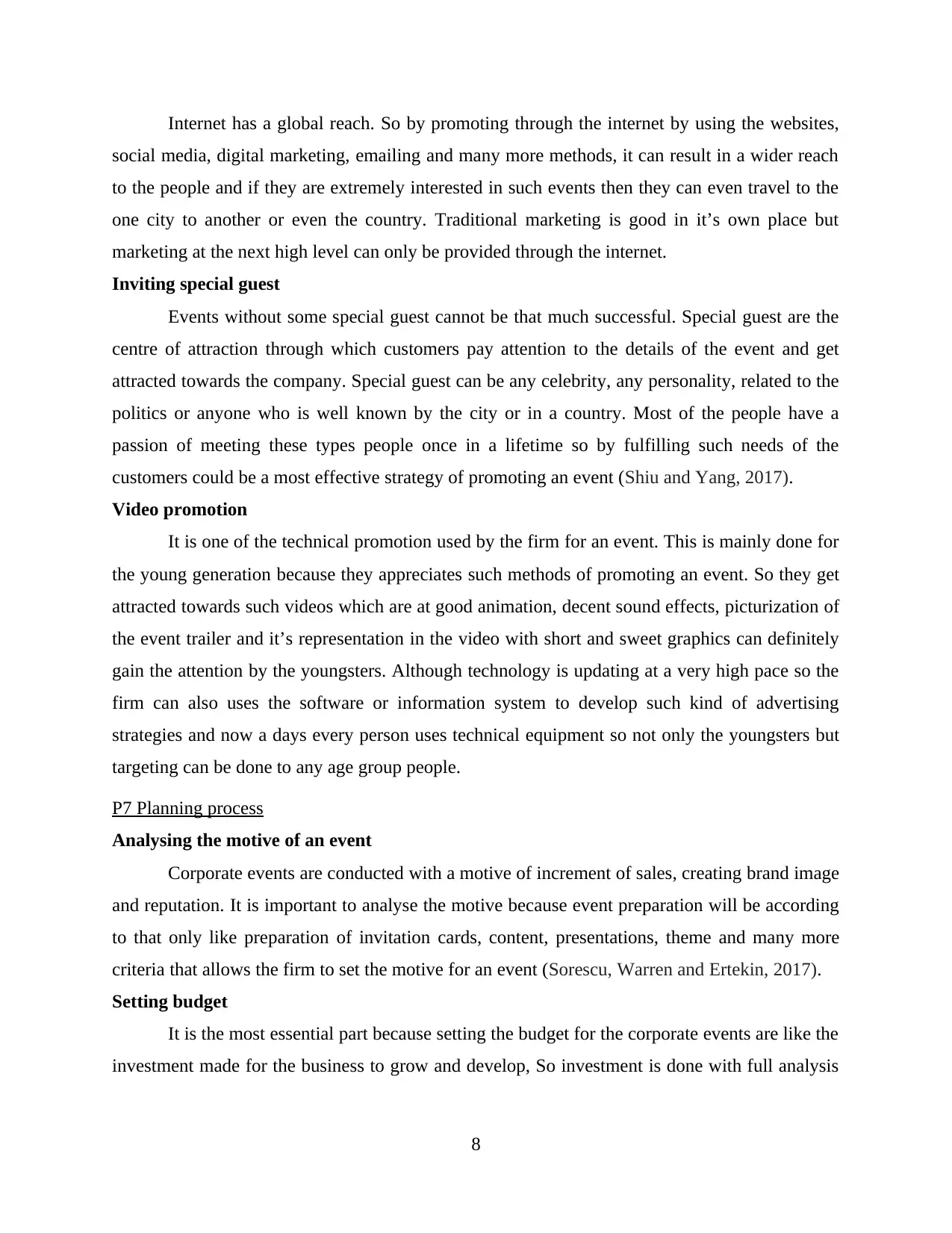
Internet has a global reach. So by promoting through the internet by using the websites,
social media, digital marketing, emailing and many more methods, it can result in a wider reach
to the people and if they are extremely interested in such events then they can even travel to the
one city to another or even the country. Traditional marketing is good in it’s own place but
marketing at the next high level can only be provided through the internet.
Inviting special guest
Events without some special guest cannot be that much successful. Special guest are the
centre of attraction through which customers pay attention to the details of the event and get
attracted towards the company. Special guest can be any celebrity, any personality, related to the
politics or anyone who is well known by the city or in a country. Most of the people have a
passion of meeting these types people once in a lifetime so by fulfilling such needs of the
customers could be a most effective strategy of promoting an event (Shiu and Yang, 2017).
Video promotion
It is one of the technical promotion used by the firm for an event. This is mainly done for
the young generation because they appreciates such methods of promoting an event. So they get
attracted towards such videos which are at good animation, decent sound effects, picturization of
the event trailer and it’s representation in the video with short and sweet graphics can definitely
gain the attention by the youngsters. Although technology is updating at a very high pace so the
firm can also uses the software or information system to develop such kind of advertising
strategies and now a days every person uses technical equipment so not only the youngsters but
targeting can be done to any age group people.
P7 Planning process
Analysing the motive of an event
Corporate events are conducted with a motive of increment of sales, creating brand image
and reputation. It is important to analyse the motive because event preparation will be according
to that only like preparation of invitation cards, content, presentations, theme and many more
criteria that allows the firm to set the motive for an event (Sorescu, Warren and Ertekin, 2017).
Setting budget
It is the most essential part because setting the budget for the corporate events are like the
investment made for the business to grow and develop, So investment is done with full analysis
8
social media, digital marketing, emailing and many more methods, it can result in a wider reach
to the people and if they are extremely interested in such events then they can even travel to the
one city to another or even the country. Traditional marketing is good in it’s own place but
marketing at the next high level can only be provided through the internet.
Inviting special guest
Events without some special guest cannot be that much successful. Special guest are the
centre of attraction through which customers pay attention to the details of the event and get
attracted towards the company. Special guest can be any celebrity, any personality, related to the
politics or anyone who is well known by the city or in a country. Most of the people have a
passion of meeting these types people once in a lifetime so by fulfilling such needs of the
customers could be a most effective strategy of promoting an event (Shiu and Yang, 2017).
Video promotion
It is one of the technical promotion used by the firm for an event. This is mainly done for
the young generation because they appreciates such methods of promoting an event. So they get
attracted towards such videos which are at good animation, decent sound effects, picturization of
the event trailer and it’s representation in the video with short and sweet graphics can definitely
gain the attention by the youngsters. Although technology is updating at a very high pace so the
firm can also uses the software or information system to develop such kind of advertising
strategies and now a days every person uses technical equipment so not only the youngsters but
targeting can be done to any age group people.
P7 Planning process
Analysing the motive of an event
Corporate events are conducted with a motive of increment of sales, creating brand image
and reputation. It is important to analyse the motive because event preparation will be according
to that only like preparation of invitation cards, content, presentations, theme and many more
criteria that allows the firm to set the motive for an event (Sorescu, Warren and Ertekin, 2017).
Setting budget
It is the most essential part because setting the budget for the corporate events are like the
investment made for the business to grow and develop, So investment is done with full analysis
8
Paraphrase This Document
Need a fresh take? Get an instant paraphrase of this document with our AI Paraphraser
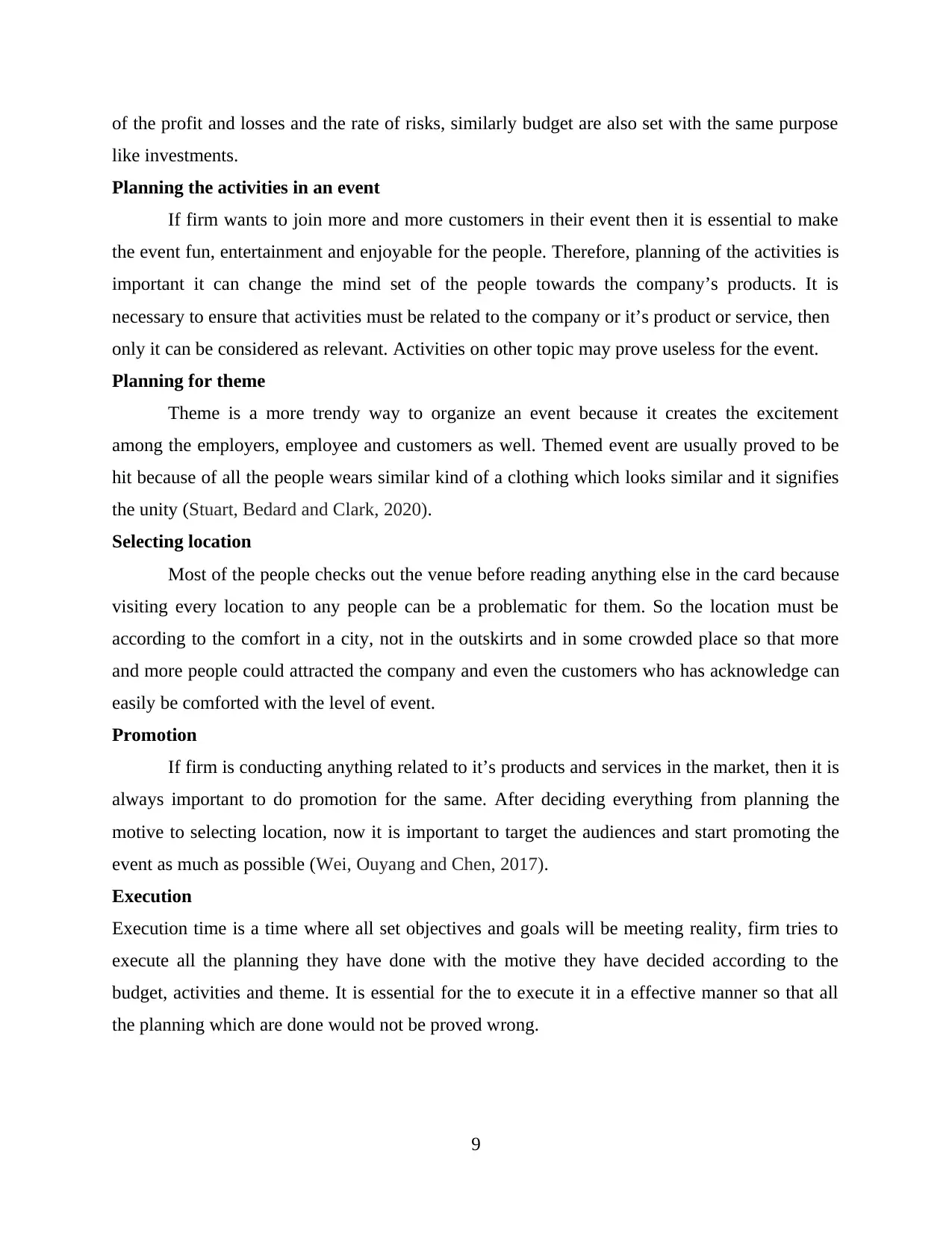
of the profit and losses and the rate of risks, similarly budget are also set with the same purpose
like investments.
Planning the activities in an event
If firm wants to join more and more customers in their event then it is essential to make
the event fun, entertainment and enjoyable for the people. Therefore, planning of the activities is
important it can change the mind set of the people towards the company’s products. It is
necessary to ensure that activities must be related to the company or it’s product or service, then
only it can be considered as relevant. Activities on other topic may prove useless for the event.
Planning for theme
Theme is a more trendy way to organize an event because it creates the excitement
among the employers, employee and customers as well. Themed event are usually proved to be
hit because of all the people wears similar kind of a clothing which looks similar and it signifies
the unity (Stuart, Bedard and Clark, 2020).
Selecting location
Most of the people checks out the venue before reading anything else in the card because
visiting every location to any people can be a problematic for them. So the location must be
according to the comfort in a city, not in the outskirts and in some crowded place so that more
and more people could attracted the company and even the customers who has acknowledge can
easily be comforted with the level of event.
Promotion
If firm is conducting anything related to it’s products and services in the market, then it is
always important to do promotion for the same. After deciding everything from planning the
motive to selecting location, now it is important to target the audiences and start promoting the
event as much as possible (Wei, Ouyang and Chen, 2017).
Execution
Execution time is a time where all set objectives and goals will be meeting reality, firm tries to
execute all the planning they have done with the motive they have decided according to the
budget, activities and theme. It is essential for the to execute it in a effective manner so that all
the planning which are done would not be proved wrong.
9
like investments.
Planning the activities in an event
If firm wants to join more and more customers in their event then it is essential to make
the event fun, entertainment and enjoyable for the people. Therefore, planning of the activities is
important it can change the mind set of the people towards the company’s products. It is
necessary to ensure that activities must be related to the company or it’s product or service, then
only it can be considered as relevant. Activities on other topic may prove useless for the event.
Planning for theme
Theme is a more trendy way to organize an event because it creates the excitement
among the employers, employee and customers as well. Themed event are usually proved to be
hit because of all the people wears similar kind of a clothing which looks similar and it signifies
the unity (Stuart, Bedard and Clark, 2020).
Selecting location
Most of the people checks out the venue before reading anything else in the card because
visiting every location to any people can be a problematic for them. So the location must be
according to the comfort in a city, not in the outskirts and in some crowded place so that more
and more people could attracted the company and even the customers who has acknowledge can
easily be comforted with the level of event.
Promotion
If firm is conducting anything related to it’s products and services in the market, then it is
always important to do promotion for the same. After deciding everything from planning the
motive to selecting location, now it is important to target the audiences and start promoting the
event as much as possible (Wei, Ouyang and Chen, 2017).
Execution
Execution time is a time where all set objectives and goals will be meeting reality, firm tries to
execute all the planning they have done with the motive they have decided according to the
budget, activities and theme. It is essential for the to execute it in a effective manner so that all
the planning which are done would not be proved wrong.
9
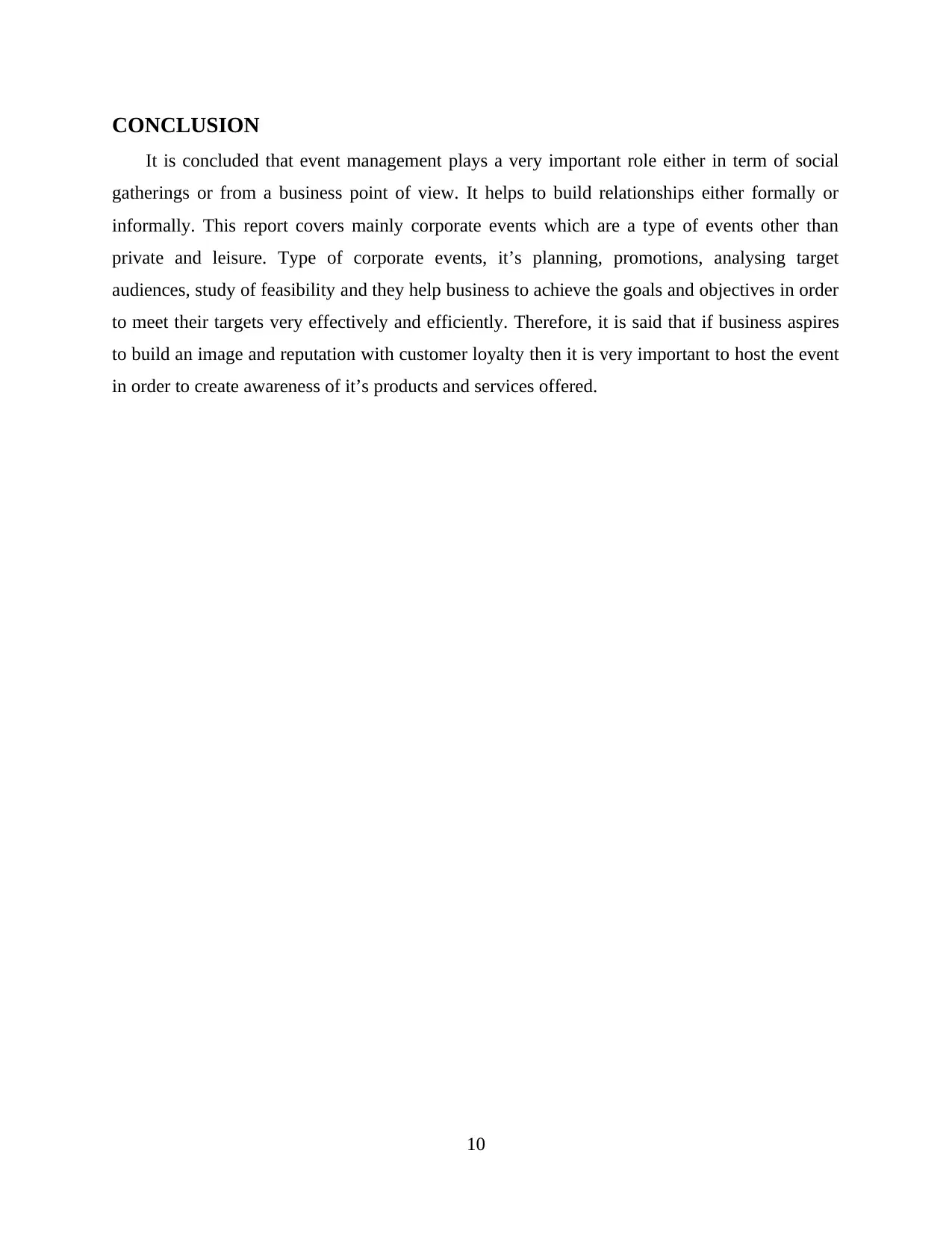
CONCLUSION
It is concluded that event management plays a very important role either in term of social
gatherings or from a business point of view. It helps to build relationships either formally or
informally. This report covers mainly corporate events which are a type of events other than
private and leisure. Type of corporate events, it’s planning, promotions, analysing target
audiences, study of feasibility and they help business to achieve the goals and objectives in order
to meet their targets very effectively and efficiently. Therefore, it is said that if business aspires
to build an image and reputation with customer loyalty then it is very important to host the event
in order to create awareness of it’s products and services offered.
10
It is concluded that event management plays a very important role either in term of social
gatherings or from a business point of view. It helps to build relationships either formally or
informally. This report covers mainly corporate events which are a type of events other than
private and leisure. Type of corporate events, it’s planning, promotions, analysing target
audiences, study of feasibility and they help business to achieve the goals and objectives in order
to meet their targets very effectively and efficiently. Therefore, it is said that if business aspires
to build an image and reputation with customer loyalty then it is very important to host the event
in order to create awareness of it’s products and services offered.
10
⊘ This is a preview!⊘
Do you want full access?
Subscribe today to unlock all pages.

Trusted by 1+ million students worldwide
1 out of 13
Related Documents
Your All-in-One AI-Powered Toolkit for Academic Success.
+13062052269
info@desklib.com
Available 24*7 on WhatsApp / Email
![[object Object]](/_next/static/media/star-bottom.7253800d.svg)
Unlock your academic potential
Copyright © 2020–2026 A2Z Services. All Rights Reserved. Developed and managed by ZUCOL.





